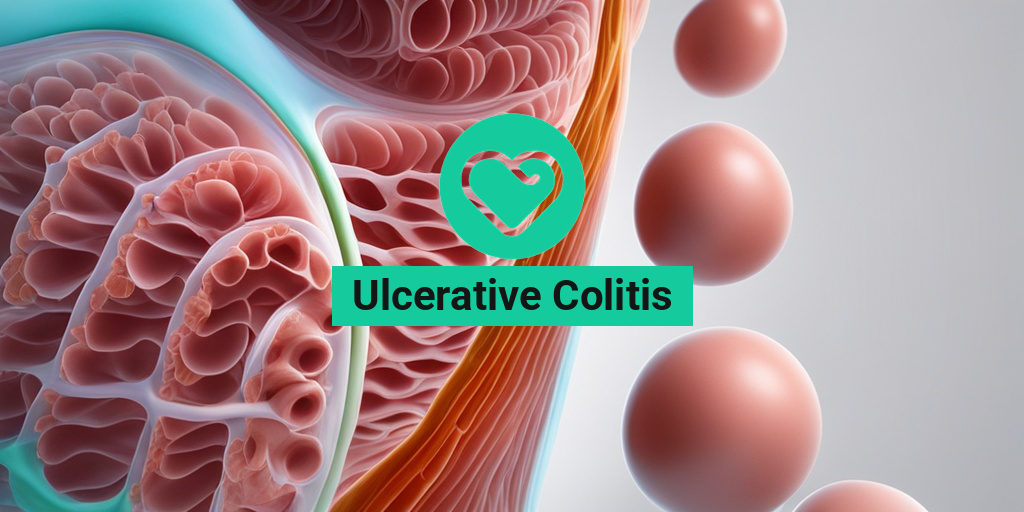“`html
What Is Ulcerative Colitis?
Ulcerative Colitis (UC) is a chronic inflammatory bowel disease (IBD) that primarily affects the colon and rectum. It is characterized by inflammation and ulceration of the inner lining of the large intestine, leading to a variety of uncomfortable symptoms. While the exact cause of ulcerative colitis remains unclear, it is believed to involve a combination of genetic, environmental, and immune system factors.
Understanding the Disease
UC is part of a group of disorders known as inflammatory bowel diseases, which also includes Crohn’s disease. Unlike Crohn’s disease, which can affect any part of the gastrointestinal tract, ulcerative colitis is confined to the colon. The inflammation can occur in different sections of the colon, leading to various forms of the disease, such as:
- Ulcerative Proctitis: Inflammation limited to the rectum.
- Left-sided Colitis: Inflammation affecting the left side of the colon.
- Pan-ulcerative Colitis: Inflammation that affects the entire colon.
Who Is Affected?
Ulcerative colitis can occur at any age, but it is most commonly diagnosed in individuals between the ages of 15 and 30. It affects both men and women equally, and while the exact prevalence varies by region, it is more common in developed countries. Family history can also play a role, as those with relatives who have UC are at a higher risk of developing the condition.
Ulcerative Colitis Symptoms
The symptoms of ulcerative colitis can vary significantly from person to person and may range from mild to severe. Understanding these symptoms is crucial for early diagnosis and effective management of the disease.
Common Symptoms
Some of the most common symptoms of ulcerative colitis include:
- Diarrhea: Frequent, loose, and watery stools, often accompanied by urgency.
- Abdominal Pain: Cramping and pain in the abdomen, which can vary in intensity.
- Rectal Bleeding: Blood in the stool or rectal bleeding is a common symptom.
- Fatigue: Chronic fatigue and weakness due to inflammation and nutrient malabsorption.
- Weight Loss: Unintentional weight loss due to reduced appetite and nutrient absorption.
Symptoms in Females
While ulcerative colitis affects both genders, some studies suggest that women may experience unique symptoms or complications. For instance, hormonal changes during menstruation can exacerbate symptoms, leading to increased discomfort. Additionally, women with UC may face challenges related to pregnancy and fertility, making it essential to consult healthcare providers for tailored advice.
When to Seek Medical Attention
If you experience persistent symptoms such as severe abdominal pain, significant weight loss, or rectal bleeding, it is crucial to seek medical attention. Early diagnosis and treatment can help manage symptoms effectively and improve your quality of life. Healthcare professionals may conduct various tests, including colonoscopy and imaging studies, to confirm a diagnosis of ulcerative colitis.
Managing Symptoms
Managing ulcerative colitis symptoms often requires a comprehensive approach, including medication, dietary changes, and lifestyle modifications. Some common treatments include:
- Medications: Anti-inflammatory drugs, immunosuppressants, and biologics are commonly prescribed to reduce inflammation and manage symptoms.
- Dietary Adjustments: A well-balanced diet tailored to individual needs can help alleviate symptoms. Many patients find relief by avoiding trigger foods.
- Support Groups: Connecting with others who have ulcerative colitis can provide emotional support and practical advice.
For more information on managing ulcerative colitis and finding evidence-based health answers, consider visiting Yesil Health AI. They offer valuable resources to help you navigate your health journey.
In conclusion, understanding ulcerative colitis and its symptoms is vital for effective management. If you or someone you know is struggling with this condition, remember that support and treatment options are available. 🌟
“`

“`html
Causes of Ulcerative Colitis
Ulcerative colitis (UC) is a chronic inflammatory bowel disease that primarily affects the colon and rectum. While the exact cause of ulcerative colitis remains unclear, several factors are believed to contribute to its development. Understanding these causes can help in managing the condition more effectively.
Genetic Factors
Research indicates that genetics play a significant role in the development of ulcerative colitis. Individuals with a family history of UC or other inflammatory bowel diseases (IBD) are at a higher risk. Specific genes associated with immune system function may predispose individuals to this condition.
Immune System Response
Another potential cause of ulcerative colitis is an abnormal immune response. In some cases, the immune system mistakenly attacks the cells in the colon, leading to inflammation. This immune response can be triggered by various factors, including infections or environmental agents, which may provoke an inflammatory reaction in genetically susceptible individuals.
Environmental Factors
Environmental factors are also thought to contribute to the onset of ulcerative colitis. Some of these factors include:
- Diet: Certain diets high in fats and low in fiber may increase the risk of developing UC.
- Smoking: Interestingly, while smoking is a known risk factor for Crohn’s disease, it appears to have a protective effect against ulcerative colitis. However, quitting smoking can trigger UC in some individuals.
- Pollution: Exposure to environmental pollutants and toxins may also play a role in the development of ulcerative colitis.
Microbiome Imbalance
The gut microbiome, which consists of trillions of bacteria, plays a crucial role in digestive health. An imbalance in these gut bacteria may contribute to the inflammation seen in ulcerative colitis. Factors such as antibiotic use, diet, and lifestyle can disrupt the microbiome, potentially leading to UC.
Risk Factors for Ulcerative Colitis
Identifying the risk factors for ulcerative colitis can help individuals understand their likelihood of developing this condition. While anyone can develop UC, certain factors increase the risk.
Age
Ulcerative colitis can occur at any age, but it is most commonly diagnosed in individuals between the ages of 15 and 30. A second peak in incidence occurs in people aged 50 to 70. Early diagnosis and management are crucial for better outcomes.
Family History
As mentioned earlier, having a family history of ulcerative colitis or other inflammatory bowel diseases significantly increases the risk. If a close relative has UC, it’s essential to be vigilant about symptoms and seek medical advice if necessary.
Ethnicity
Ulcerative colitis is more prevalent among individuals of Ashkenazi Jewish descent. However, it can affect people of any ethnicity. Understanding this can help in recognizing the condition early, especially in high-risk populations.
Other Autoimmune Diseases
Individuals with other autoimmune diseases, such as rheumatoid arthritis, lupus, or type 1 diabetes, are at a higher risk of developing ulcerative colitis. The presence of one autoimmune condition may indicate a predisposition to others.
Geographical Location
Research suggests that ulcerative colitis is more common in developed countries, particularly in urban areas. This may be linked to lifestyle factors, diet, and environmental exposures that differ between urban and rural settings.
Stress and Mental Health
While stress does not directly cause ulcerative colitis, it can exacerbate symptoms and trigger flare-ups. Mental health conditions, such as anxiety and depression, are also common among individuals with UC, highlighting the importance of a holistic approach to treatment.
Understanding the causes and risk factors of ulcerative colitis is essential for early detection and effective management. If you or someone you know is experiencing symptoms of ulcerative colitis, such as abdominal pain, diarrhea, or rectal bleeding, it’s crucial to consult a healthcare professional for proper diagnosis and treatment. 🌟
“`

“`html
Diagnosing Ulcerative Colitis
Diagnosing Ulcerative Colitis can be a complex process, as its symptoms often overlap with other gastrointestinal disorders. If you’re experiencing persistent digestive issues, it’s essential to consult a healthcare professional for an accurate diagnosis. Here’s what you need to know about the diagnostic process.
Common Symptoms to Watch For
Before diving into diagnostic tests, it’s crucial to recognize the common symptoms associated with Ulcerative Colitis. These may include:
- Abdominal pain and cramping
- Diarrhea, often with blood or pus
- Urgency to have a bowel movement
- Fatigue
- Weight loss
- Fever
If you notice these symptoms, especially if they persist for more than a few days, it’s time to seek medical advice. 🩺
Medical History and Physical Examination
Your healthcare provider will start by taking a detailed medical history. This includes asking about your symptoms, family history of gastrointestinal diseases, and any medications you’re currently taking. A physical examination will also be conducted to check for signs of inflammation or other complications.
Diagnostic Tests
To confirm a diagnosis of Ulcerative Colitis, several tests may be performed:
- Blood Tests: These can help identify anemia or signs of inflammation.
- Stool Tests: These tests check for infections or the presence of blood in the stool.
- Colonoscopy: This is the most definitive test for diagnosing Ulcerative Colitis. A flexible tube with a camera is inserted into the rectum to examine the colon and take biopsies if necessary.
- Imaging Tests: CT scans or MRIs may be used to assess the extent of inflammation and rule out other conditions.
Each of these tests plays a vital role in determining the presence and severity of Ulcerative Colitis. 🏥
Ulcerative Colitis Treatment Options
Once diagnosed, managing Ulcerative Colitis becomes the next priority. Treatment aims to reduce inflammation, manage symptoms, and achieve remission. Here’s a breakdown of the most common treatment options available.
Medications
Medications are often the first line of defense against Ulcerative Colitis. They can help control inflammation and alleviate symptoms. Common categories include:
- Aminosalicylates: These anti-inflammatory drugs are often used for mild to moderate cases.
- Corticosteroids: These are prescribed for more severe symptoms but are not recommended for long-term use due to potential side effects.
- Immunomodulators: These medications help suppress the immune system to reduce inflammation.
- Biologics: Targeted therapies that can be effective for moderate to severe cases, especially when other treatments fail.
It’s essential to work closely with your healthcare provider to find the right medication regimen for your specific needs. 💊
Dietary Changes
While there’s no one-size-fits-all diet for Ulcerative Colitis, certain dietary adjustments can help manage symptoms. Consider the following:
- Low-Fiber Foods: During flare-ups, low-fiber foods may be easier to digest.
- Avoiding Trigger Foods: Keep a food diary to identify and eliminate foods that worsen your symptoms.
- Staying Hydrated: Diarrhea can lead to dehydration, so drink plenty of fluids.
Consulting a nutritionist who specializes in gastrointestinal disorders can provide personalized dietary advice. 🥗
Surgery
In severe cases where medications and lifestyle changes are ineffective, surgery may be necessary. Surgical options include:
- Colectomy: Removal of the colon, which can provide a cure for Ulcerative Colitis.
- Ileal Pouch-Anal Anastomosis (IPAA): This procedure creates a pouch from the small intestine to store waste, allowing for normal bowel function.
Surgery is typically considered a last resort but can significantly improve quality of life for those with severe disease. ⚕️
Managing Ulcerative Colitis requires a comprehensive approach that includes medical treatment, dietary adjustments, and sometimes surgical intervention. Always consult with your healthcare provider to determine the best course of action for your individual situation.
“`

“`html
Living with Ulcerative Colitis
Living with Ulcerative Colitis can be a challenging journey, filled with ups and downs. This chronic inflammatory bowel disease primarily affects the colon and rectum, leading to a range of symptoms that can significantly impact daily life. Understanding how to manage these symptoms and maintain a good quality of life is crucial for those diagnosed with this condition.
Understanding the Symptoms
Symptoms of Ulcerative Colitis can vary widely among individuals, but common signs include:
- Abdominal pain and cramping
- Diarrhea, often with blood or pus
- Fatigue and weakness
- Weight loss
- Urgency to have a bowel movement
For many, these symptoms can be unpredictable, leading to anxiety and stress. It’s essential to recognize triggers and develop a plan to manage flare-ups effectively.
Creating a Supportive Environment
Support from family, friends, and healthcare providers is vital for those living with Ulcerative Colitis. Here are some ways to foster a supportive environment:
- Open Communication: Share your experiences and feelings with loved ones. This can help them understand what you’re going through.
- Join Support Groups: Connecting with others who have Ulcerative Colitis can provide emotional support and practical advice.
- Educate Yourself: Knowledge is power. Understanding your condition can help you make informed decisions about your treatment and lifestyle.
Diet and Nutrition
Many individuals with Ulcerative Colitis find that certain foods can exacerbate their symptoms. While there is no one-size-fits-all diet, some general tips include:
- Keep a Food Diary: Track what you eat and how it affects your symptoms to identify potential triggers.
- Stay Hydrated: Drink plenty of fluids, especially during flare-ups when diarrhea can lead to dehydration.
- Consider a Low-FODMAP Diet: Some people find relief by reducing fermentable carbohydrates that can cause bloating and gas.
Consulting with a registered dietitian who specializes in Ulcerative Colitis can also be beneficial in creating a personalized nutrition plan.
Ulcerative Colitis Complications
While many individuals manage their Ulcerative Colitis symptoms effectively, complications can arise. Understanding these potential issues is crucial for proactive management and treatment.
Potential Complications
Some complications associated with Ulcerative Colitis include:
- Severe Dehydration: Chronic diarrhea can lead to significant fluid loss, requiring medical intervention.
- Colon Perforation: In severe cases, the colon can develop holes, leading to life-threatening infections.
- Increased Risk of Colon Cancer: Long-term inflammation in the colon can increase the risk of developing colorectal cancer.
- Extraintestinal Manifestations: Conditions such as arthritis, skin disorders, and eye inflammation can occur outside the gastrointestinal tract.
Monitoring and Regular Check-ups
Regular check-ups with a healthcare provider are essential for monitoring the progression of Ulcerative Colitis and identifying any complications early. This may include:
- Colonoscopy: Regular screenings can help detect changes in the colon that may indicate cancer.
- Blood Tests: These can assess inflammation levels and nutritional deficiencies.
- Imaging Studies: In some cases, imaging may be necessary to evaluate the extent of the disease.
Managing Complications
When complications arise, treatment options may vary based on the severity and type of issue. Some common approaches include:
- Medications: Adjusting or changing medications can help manage symptoms and prevent complications.
- Surgery: In severe cases, surgical intervention may be necessary to remove the affected portion of the colon.
- Supportive Care: This may include hydration therapy, nutritional support, and pain management.
Living with Ulcerative Colitis requires a comprehensive approach that includes symptom management, lifestyle adjustments, and regular medical care. By staying informed and proactive, individuals can navigate the challenges of this condition more effectively. 🌟
“`

“`html
Frequently Asked Questions about Ulcerative Colitis
What is Ulcerative Colitis?
Ulcerative Colitis is a chronic inflammatory bowel disease (IBD) that causes inflammation and ulcers in the lining of the colon and rectum. It can lead to various symptoms, including abdominal pain, diarrhea, and rectal bleeding.
What are the common symptoms of Ulcerative Colitis?
- Abdominal pain and cramping
- Frequent diarrhea, often with blood or pus
- Urgency to have a bowel movement
- Fatigue and weakness
- Weight loss
How is Ulcerative Colitis diagnosed?
Diagnosis typically involves a combination of medical history, physical examination, laboratory tests, and imaging studies. A colonoscopy is often performed to visualize the colon and obtain tissue samples for biopsy.
What are the treatment options for Ulcerative Colitis?
Treatment for Ulcerative Colitis may include:
- Medications such as anti-inflammatory drugs, immunosuppressants, and biologics
- Dietary changes to manage symptoms
- In severe cases, surgery may be necessary to remove the colon
Is there a specific diet for Ulcerative Colitis?
While there is no one-size-fits-all diet, many individuals find relief by avoiding certain foods that trigger symptoms. A diet rich in fruits, vegetables, and lean proteins is often recommended, while high-fiber and spicy foods may need to be limited.
Can Ulcerative Colitis affect women differently?
Yes, Ulcerative Colitis symptoms in females can sometimes differ from those in males. Women may experience additional symptoms related to hormonal changes, especially during menstruation.
What are the potential causes of Ulcerative Colitis?
The exact cause of Ulcerative Colitis is unknown, but it is believed to involve a combination of genetic, environmental, and immune system factors. Stress and diet may also play a role in exacerbating symptoms.
Are there any complications associated with Ulcerative Colitis?
Yes, complications can include:
- Severe dehydration
- Colon perforation
- Increased risk of colon cancer
How can I support someone with Ulcerative Colitis?
Being supportive involves understanding their condition, being patient during flare-ups, and encouraging them to seek medical advice. Offering to help with daily tasks can also be beneficial.
Is it safe to use supplements or alternative treatments with Ulcerative Colitis?
Before starting any supplements or alternative treatments, it is crucial to consult with a healthcare provider. Some supplements may interact with medications or exacerbate symptoms.
What should I do if I suspect I have Ulcerative Colitis?
If you experience symptoms consistent with Ulcerative Colitis, it is important to consult a healthcare professional for an accurate diagnosis and appropriate treatment plan.
“`




